|
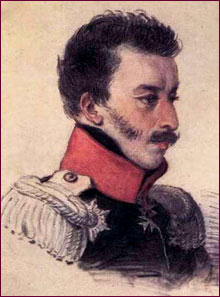 The
history of Russia encompasses a vast range of revolutionary
activity, aimed at the overthrow of the autocracy, from the
unsuccessful uprising of Stepan Razin to the bloody upheaval
of 1917. For the most part, the early revolts were provoked
by the common folk who lacked functional knowledge of politics
and economics to implement concrete reforms had they succeeded. The
history of Russia encompasses a vast range of revolutionary
activity, aimed at the overthrow of the autocracy, from the
unsuccessful uprising of Stepan Razin to the bloody upheaval
of 1917. For the most part, the early revolts were provoked
by the common folk who lacked functional knowledge of politics
and economics to implement concrete reforms had they succeeded.
In the early19th century, however, the tide changed
direction as revolutionary ideas began to permeate the minds
of young noblemen who, having witnessed the benefits delivered
by the constitutional government to the countries of Western
Europe, were prompted to release their motherland from the
manacles of autocratic oppression.
Appropriately named after the unsuccessful uprising
of December 14, 1825 against Tzar Nicholas I, these men entered
the pages of history as the Decembrists.
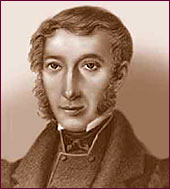 Although
the Decembrist insurrection completely failed, it was nonetheless
the first attempt in modern Russian history to overthrow the
absolutist regime whose leaders pursued specific political
goals: reorganization of the government and abolition of serfdom. Although
the Decembrist insurrection completely failed, it was nonetheless
the first attempt in modern Russian history to overthrow the
absolutist regime whose leaders pursued specific political
goals: reorganization of the government and abolition of serfdom.
For the first time in the history of Russia, there
existed an influential group of society that held conception
of Russian state as distinct and separate from the ruler and
administrative institutions. Intoxicated with the progressive
ideas of Western Enlightenment, these young men undertook
an onerous task of eradicating the absolutist regime and backwardness
of their country.
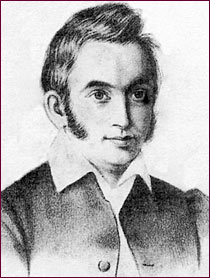 Socially,
nineteenth century Russia developed along the lines very different
from those of Western Europe. General backwardness of the
Russian society, particularly evident in the dominance of
agriculture and enslavement of the peasantry, contrasts sharply
with the rise of modern urban capitalistic state in the countries
of Western Europe. The impact of the delayed progress was
not as poignantly perceived until the War
of 1812 and subsequent exposure to the Western culture
saturated with sentiments of individual rights and freedoms
and fashioned in the manner of a contemporary industrial state. Socially,
nineteenth century Russia developed along the lines very different
from those of Western Europe. General backwardness of the
Russian society, particularly evident in the dominance of
agriculture and enslavement of the peasantry, contrasts sharply
with the rise of modern urban capitalistic state in the countries
of Western Europe. The impact of the delayed progress was
not as poignantly perceived until the War
of 1812 and subsequent exposure to the Western culture
saturated with sentiments of individual rights and freedoms
and fashioned in the manner of a contemporary industrial state.
Politically, Russia was pushed to the backfront due
to its staunch adherence to autocratic government structure
long abolished in the modernized, constitutional European
countries. Under the traditionally domineering Russian monarchs,
the nobles were victimized by the arbitrary display of monarchical
power as much as the peasants since their socio-economic well-being
depends on the whimsical benevolence of the czar who controls
the economic status of the nobility through regulation of
their estates. As members of nobility began to claim their
independence from the czar, a schism developed between the
state and the aristocracy.
Failure of the monarchy to take nobility into its confidence
resulted in estrangement of the latter from state affairs
producing an irremediable cleavage between the czar and the
nobles. Comprised of the most intellectually advanced people
of the time, intelligentsia issued its the first challenge
to the absolutist authority in the form of the Decembrist
uprising.
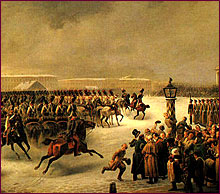 Decembrists,
in Russian history, members of secret revolutionary societies
whose activities led to the uprising of Dec., 1825, against
Czar Nicholas I. Formed after the Napoleonic Wars, the groups
comprised officers who had served in Europe and had been influenced
by Western liberal ideals. They advocated the establishment
of representative democracy but disagreed on the form it should
take; some favored a constitutional monarchy, while others
supported a democratic republic. Their poorly organized rebellion
was precipitated by the confusion surrounding the succession
to the throne on the death of Alexander I. The more moderate
members persuaded several regiments in St. Petersburg to refuse
their oath of allegiance to the unpopular Nicholas l and to
demand that his elder brother, Constantine, who had secretly
renounced the throne in 1822, be made Tsar and grant a constitution. Decembrists,
in Russian history, members of secret revolutionary societies
whose activities led to the uprising of Dec., 1825, against
Czar Nicholas I. Formed after the Napoleonic Wars, the groups
comprised officers who had served in Europe and had been influenced
by Western liberal ideals. They advocated the establishment
of representative democracy but disagreed on the form it should
take; some favored a constitutional monarchy, while others
supported a democratic republic. Their poorly organized rebellion
was precipitated by the confusion surrounding the succession
to the throne on the death of Alexander I. The more moderate
members persuaded several regiments in St. Petersburg to refuse
their oath of allegiance to the unpopular Nicholas l and to
demand that his elder brother, Constantine, who had secretly
renounced the throne in 1822, be made Tsar and grant a constitution.
After some initial hesitation, Nickolas l firmly crushed
the revolt and was recognized as undisputed ruler of the Russian
Empire.
He firmly believed in the autocracy. Nickolas saw himself
as God's general in charge of Russia's well-being and every
citizen as his subordinate. He insisted his will be followed
at all times and ruled the Empire personally. Unlimited power,
such as held by Nickolas, would have been a disaster in the
hands of an immoral or unscrupulous man. The new Tsar was
neither. Nickolas was a convinced Orthodox Christian and truly
felt he was accountable to God for his actions. He felt his
own service to the nation was the prototype that all Russians
should follow. Nickolas' attitude was rigidly military. His
narrow-mindedness and egotism created the "Nickolas System",
based on "One Tsar, One Faith,
One Nation".
|
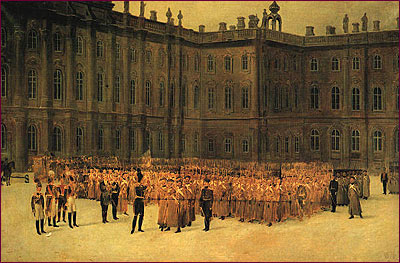
Tzar Nicholas l, in front of the
Winter Palace on the Senate Square, before shooting Desembrists,
V. Masutov, 1861.
The uprising, ill-conceived and badly led, was a disaster.
Over 3,000 of the soldiers were promptly arrested. Of these,
five were hanged. As if to sum up the officers’ frustration
with backward Russia, one remarked, upon only breaking his legs
on the scaffold, "They can’t
even hang a man properly in Russia." Over 120
of the conspirators were exiled.
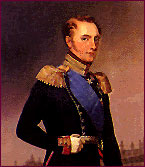 The
partial source of the Decembrists' failure is to be located
precisely in their removal from the populace whose alleviation
they were campaigning. Although the Decembrists sincerely desired
allayment of the yoke of serfdom from the necks of the peasantry,
the idea of cooperation with the mob was repugnant even to the
most liberal Decembrists. As they confined themselves to the
intellectual circle, the Decembrists developed erroneous perceptions
of what freedom means to the Russian peasant. Although they
have lived side by side with the serfs from childhood, none
of the Decembrists truly understands the mind of the peasant. The
partial source of the Decembrists' failure is to be located
precisely in their removal from the populace whose alleviation
they were campaigning. Although the Decembrists sincerely desired
allayment of the yoke of serfdom from the necks of the peasantry,
the idea of cooperation with the mob was repugnant even to the
most liberal Decembrists. As they confined themselves to the
intellectual circle, the Decembrists developed erroneous perceptions
of what freedom means to the Russian peasant. Although they
have lived side by side with the serfs from childhood, none
of the Decembrists truly understands the mind of the peasant.
When in 1917 Lenin's Provisional Government became the
ruling clique of Russia, Lenin takes into notice the cardinal
miscue of Decembrists - failure to cooperate with the masses.
He writes,
"...we see three generations,
three classes at work in the Russian revolution. First come
the gentry and landowners, the Decembrists. The circle of these
revolutionaries is narrow. They are terribly far from the people."
The Decembrists’ insurrection made a profound impression
on Russia. It led both to the increasing police terrorism of
the tsarist government and to the spread of revolutionary activity
among the educated classes.

|
|
|
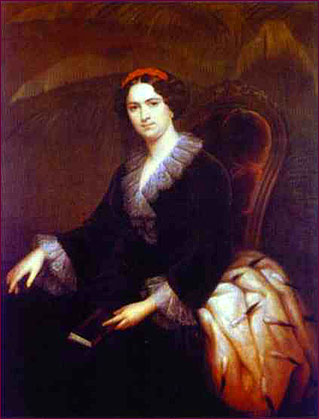
Sergey Zaryanko. Portrait of Princess
Trubetskaya, wife of the Desembrist Sergei Trubetskoy, 1856.
Oil on canvas. The Russian Museum, St. Petersburg.
|

|
Decembrists' Wives
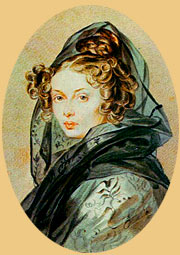
In a show of loyalty to their husbands, nearly all
the wives of Decembrists followed the men into exile.
Among them numbered eight prominent members of the
aristocracy. The most famous of these are Ekaterina Trubitskaya
and Maria Volkonskaya.
In order to strike the Decembrists totally out of their
lives, the Church and State passed a law whereby the Decembrist's
wives were considered widows and allowed to remarry within
their husbands' lifetime without an official divorce. However,
Yekaterina Trubetskaya turned down this offer, and so did
the other Decembrist's wives. When they departed for Siberia,
they left behind their privilegies as nobles and were reduced
to the status of exiled prisoners' wives, with restricted
rights of travel, correspondence and property ownership. They
were not allowed to take their children with them, and were
not always allowed to return to the European part of Russia
even after their husbands' death.
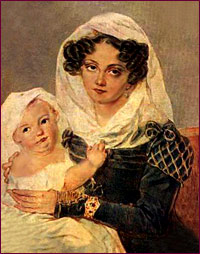 But
nothing could stop these courageous women. Yekaterina Trubetskaya,
wife of the General Sergey Trubetskoi, was the first to leave
for Siberia (in July 1826). But
nothing could stop these courageous women. Yekaterina Trubetskaya,
wife of the General Sergey Trubetskoi, was the first to leave
for Siberia (in July 1826).
The beautiful Maria Volkonskaya, daughter of the General
N. Raevski, and a wife of General-Major Sergey Volkonsky,
just had a baby when her husband was exiled. Without telling
her family, she asked Tzar's permission to follow her husband
to Siberia. Forced to renounce all her possessions and titles,
she even had to leave her infant son behind. She followed
her husband to the salt, silver and lead mines where the workers
toiled from six in the morning until 11 at night, in chains.
The portrait of her holding her baby son Nicholas was the
only thing that reminded her of him during the 30 years that
she spent in Siberia. (The baby died 2 years after her departure.)
Here, the wives were allowed to visit them twice a
week. Eventually, the prisoners’ conditions improved.
Pushkin,
a friend of many of the Decembrists, wrote a poem about them
in 1827. He too was inspired by their tales of unconditional
love. The female protagonist of "Eugene Onegin"
is based on one of the wives.
Pushkin wrote in "Eugene Onegin":
"Love tyrannises
all the ages; but youthful, virgin hearts derive a blessing
from its blasts and rages, like fields in spring when storms
arrive."
 In
an old wooden mansion in Irkutsk, Maria Volkonskaya would
sit at her inlaid table, surrounded by her Empire furniture,
her library of over three thousand books, her gilt Italian
music box and her opera glasses for the opera she never again
attended. Here, she would gaze out of the window and observe
her husband, once a famous general, pottering eccentrically
about his vegetable garden while the children of the poor
which she had adopted scurried about the house. In
an old wooden mansion in Irkutsk, Maria Volkonskaya would
sit at her inlaid table, surrounded by her Empire furniture,
her library of over three thousand books, her gilt Italian
music box and her opera glasses for the opera she never again
attended. Here, she would gaze out of the window and observe
her husband, once a famous general, pottering eccentrically
about his vegetable garden while the children of the poor
which she had adopted scurried about the house.
Despite the charitable deeds, the bejewelled balls,
the touching amateur dramatics, a sadness permeates the walls
of the Volkonsky house. The wives of the Decembrists were
still exiles, unable even to write to their relations for
the first terrible years. They gave up everything. Staring
absentmindedly out of the window, you can imagine her dreaming
back to the glorious Saint Petersburg of her youth, to the
balls of the immense Winter Palace,
to another life which was denied her.
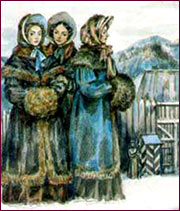 She
died in 1863, seven years after the pardon Tsar Alexander
II finally granted the Decembrists. The Volkonskys returned
to the capital. But they were old now, and many of their friends
had died. Life and the city had moved on, and they felt like
strangers. At the end of her life she confided that she had
been happy, and perhaps happier, in Irkutsk. Reading at her
desk, dreaming of the opera, the sound of children’s
games echoing around the house. She
died in 1863, seven years after the pardon Tsar Alexander
II finally granted the Decembrists. The Volkonskys returned
to the capital. But they were old now, and many of their friends
had died. Life and the city had moved on, and they felt like
strangers. At the end of her life she confided that she had
been happy, and perhaps happier, in Irkutsk. Reading at her
desk, dreaming of the opera, the sound of children’s
games echoing around the house.
In 1839, Trubetskoy was deported to the small village
of Oyok, thirty-eight kilornetres from Irkutsk, and Yekaterina
Trubetskaya and their three daughters and son, who had been
born in Siberia, went with him. Although their relatives sent
them large sums of money, the family still had financial problems.
The Siberian soil tilled by the Decembrists became
for some of them a place of eternal rest. In the graveyard
of the Znamensky Monastery, there are small, modest monuments
of Baikal marble on the graves of Decembrists N. Panov, P.
Mukhanov, and V. Beschasny. Yekaterina Trubetskaya and her
children are also buried here.
Click
here to read more about Decembrists.
Another good website - Decembrists
of Siberia.
Tours
to Decabrists places in Siberia. V. Obolensky's article
"Decembrists and Russian Freemasons".
|
|



